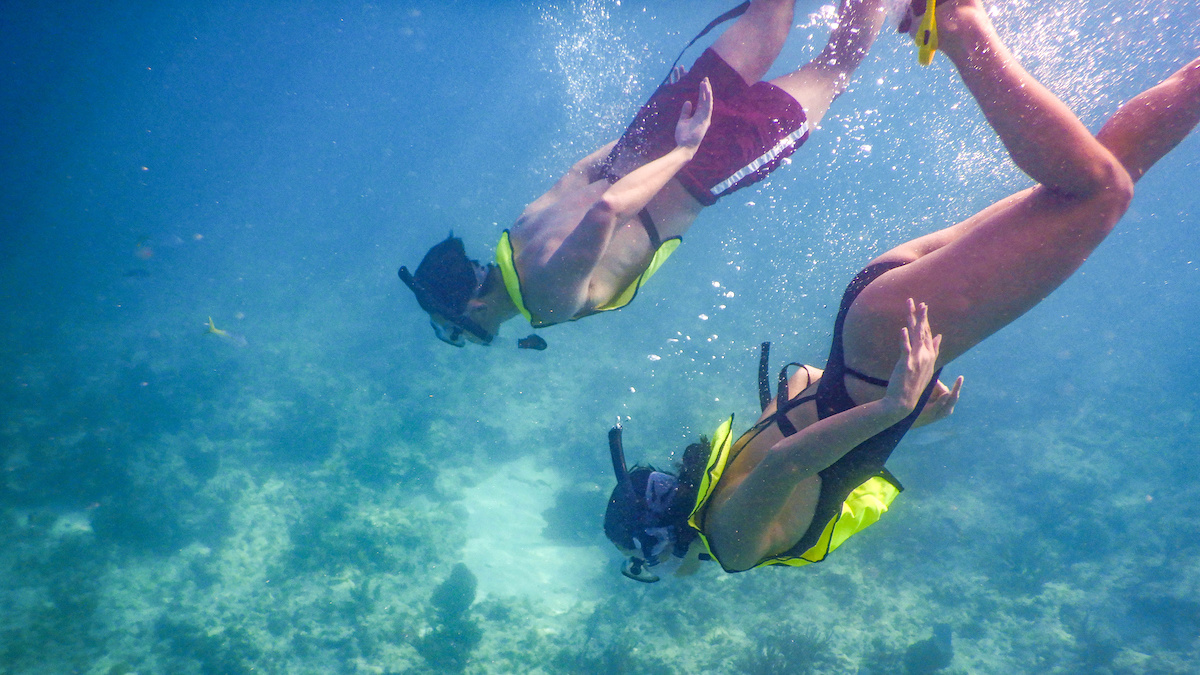

Experts are worried that COVID-19, a primarily respiratory and airway disease, could have permanent effects on lungs, inhibiting the ability for divers to continue diving. Tiffany Duong / Ocean Rebels
Scuba divers around the world are holding their metaphorical breath to see if a coronavirus infection affects the ability to dive.
Some preliminary data, while inconclusive, indicates that permanent lung damage can occur even in mild cases. All experts are advocating for further studies to examine potential permanent effects.
“Like other respiratory illnesses, COVID-19 can cause lasting lung damage,” said Dr. Matias Nochetto, director of medical service at Divers Alert Network (DAN). The doctor addressed the fears of many scuba divers in a company webinar on diving after a COVID-19 infection.
Joseph Dituri, the principal investigator in a study to use hyperbaric medicine to treat coronavirus patients, explained to EcoWatch that lung cells are damaged by both the coronavirus infection and the body’s inflammatory reaction to it, reducing lung function and gas exchange capabilities. Nochetto noted in the webinar that the inflammation causes leakage of fluid and pus into the lungs that can result in irreparable lung scarring and damage.
“This is not good for anyone’s lungs, let alone diving,” the doctor added. “There is no proof that any lungs have fully recovered from COVID-19. Everyone that has had COVID so far, even if they had COVID in January, their lungs are likely still recovering, so it is too soon to say if they are or are not gonna be able to dive.”

DAN medical experts explained the difference between normal lungs, on the left, and “very serious lungs caused by COVID-19,” on the right. Matias Nochetto / Divers Alert Network (DAN)
An April 15 report from Austria put the dive world on high alert. Dr. Frank Hartig treated six infected divers who only suffered mild symptoms, were not hospitalized and recovered at home, reported Cayman Compass.
Although “clinically recovered,” all six patients exhibited “irreversible” long-term lung damage which made a full recovery “unlikely,” Hartig said. Two exhibited asthmatic-like, irritated lungs, two suffered low oxygen supplies, and four showed “significant changes” to lung structure, reported Cayman Compass.
“None of the six divers can be released for diving for the time being, despite their well-being,” Hartig said, reported Dive Magazine.
The doctor said that patients who felt fully recovered could still suffer lung damage which could permanently prohibit scuba diving and other forms of exercise. He implored dive professionals like dive instructors and commercial divers to avoid contracting the disease at all costs.
In a responsive position statement, the Undersea Hyperbaric Medical Society (UHMS) called the findings “generalized” and “premature.” The medical society emphasized, “At the present time, we simply do not have sufficient data to support or refute the definitive proclamations made by this case series.” UHMS, the primary source of scientific information regarding diving, noted that more time and studies are needed to accurately access the potential impact of the disease on individuals’ health and ability to dive.
UHMS also highlighted that COVID-19 shares many features with other serious viral pneumonia, including requiring a “weeks or months” period of convalescence before returning to full activities, including diving.
In their webinar, DAN’s doctors similarly did not set a specific timeline for a return to diving after infection, instead advocating for individual medical assessments and fitness tests by doctors trained in dive medicine to uncover potential residual issues. Chief Medical Officer Dr. Jim Chimiak emphasized the need to evaluate any residual damage to lung structure and function due to coronavirus before considering diving again.
“It’s never bad to be conservative especially as you return to diving after a long delay,” he said. “It’s not automatically sating you can no longer dive, but it needs to be assessed on a case by case basis.”
Dr. Douglas Ebersole, a cardiology consultant for DAN, avid tech diver and recovering COVID-19 patient, agreed that there was no “one size fits all” answer to when divers who have been infected with coronavirus can safely return to the sport, reported Dive Tech.
Ebersole agreed with UHMS and DAN that it was too early to conclude whether infections could lead to permanent, sidelining injuries, but compared the coronavirus to its close viral cousin, severe acute respiratory syndrome (SARS). A 2004 study found that half of “recovered” SARS patients exhibited pulmonary function defects three months after hospital discharge, but that impairment was “mild” in most cases, Ebersole wrote.
The Belgian Society for Diving and Hyperbaric Medicine said in a statement, “A person who has had COVID-19 infection with severe pulmonary symptoms may suffer from prolonged or even permanent pulmonary damage, even if the lung function seems to have returned to (near) normal,” putting them at higher risk for lung barotrauma injuries.
The society recommending that infected, symptomatic divers wait two to three months after recovery and undergo complete pulmonary function testing, CT lung scanning, cardiac evaluations and exercise tests before attempting to dive again.
“There’s no one fully recovered,” Chimiak concluded. “Stay tuned. It’s a new disease. I think this story is not over; the book has not been written.”
- How the COVID-19 Coronavirus Attacks the Entire Body - EcoWatch
- What Does 'Recovered From Coronavirus' Mean? - EcoWatch
- Scuba Divers Make Face Masks out of Recycled Ocean Plastic ...

 233k
233k  41k
41k  Subscribe
Subscribe 